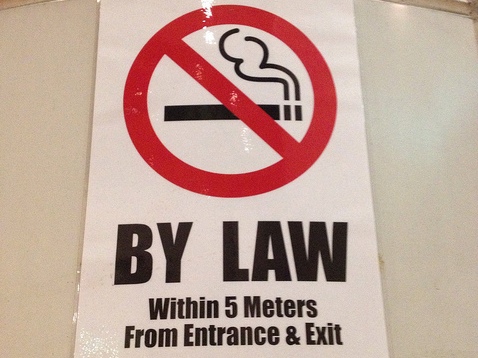David Cameron’s recent reshuffle was viewed as radical by some and controversial by others. Quite blatantly having one eye on the 2015 elections, the decisive hand of Election Director Lynton Crosby was thought to be crucial.
One place where Crosby seems to have surprisingly little influence, however, is in government advice and legislation on trying to improve the nation’s health – or the “nanny state” as it’s also known. Theresa May and the Home Office, for example, want to make pubs offer bottles of wine that contain less than 12.5 percent alcohol.
The plain packaging of cigarettes is currently going through one last six-week consultation before the decision is finally made. Insiders believe that it will be passed despite Crosby’s alleged disapproval.
Nigel Farage, never one to put his lit cigarette behind his back or hide his pint when the cameras are rolling, has been an unapologetic standard-bearer for freedom. In the European Elections, his position did not appear to be a burden, with UKIP being clear winners.
Underlining the lack of voter appeal, The Democracy Institute and its Polling Unit has just released results of an opinion poll into people’s attitudes to plain packaging. They found that 54 percent of respondents were opposed with 38 percent in favour and 9 percent undecided.
Sixty-one percent thought it was more likely to encourage the black market, with only 5 percent thinking it is less likely. Most revealing was whether the public thought that plain packaging would reduce youth smoking and 78 percent saying it would make no difference; only 12 percent said it would increase youth smoking and 11 percent a reduction.
Basham concludes: “plain packaging could prove an electoral albatross, in tandem with other nanny state-style initiatives, weighing down the Conservative vote.” He adds, “David Cameron’s tenuous hold on the keys to No 10 is threatened, in part, by voters who tell us they’re tired of government telling them what, how, and when they should eat, drink, and smoke.”
With another tight election like 2010, where UKIP may have cost the Conservatives an outright majority, Basham observes: “These results suggest UKIP’s outspoken opposition to many of the government’s public health proposals has the potential to shift, in small but critical ways, the electoral sands.”
Basham may have a good point. The Junior Minister who oversaw the smoking ban was Labour’s Gillian Merron who was the MP for Lincoln Central. At the 2005 election, she had a majority of 4,613, but in 2010 lost out to Conservative Karl McCartney with a thin majority of 1,058. The swing was 6.75 percent against a national average 5.1 percent.
It is likely that smoker’s rights group Freedom2Choose helped unseat her after starting a Facebook page called “Anyone but Gillian Merron Labour MP for Lincoln”, which was picked up by the local press who devoted four pages of news, comment and analysis on the smoking ban.
Most of the observations were negative from pub closures, unemployment and a lack of choice. Although hard to be definitive, it certainly did not do any harm to McCartney’s prospects.
Jane Ellison, the current Junior Health Minister nursing a majority of 5,977 in Battersea, may have lessons to learn.

COMMENTS
Please let us know if you're having issues with commenting.